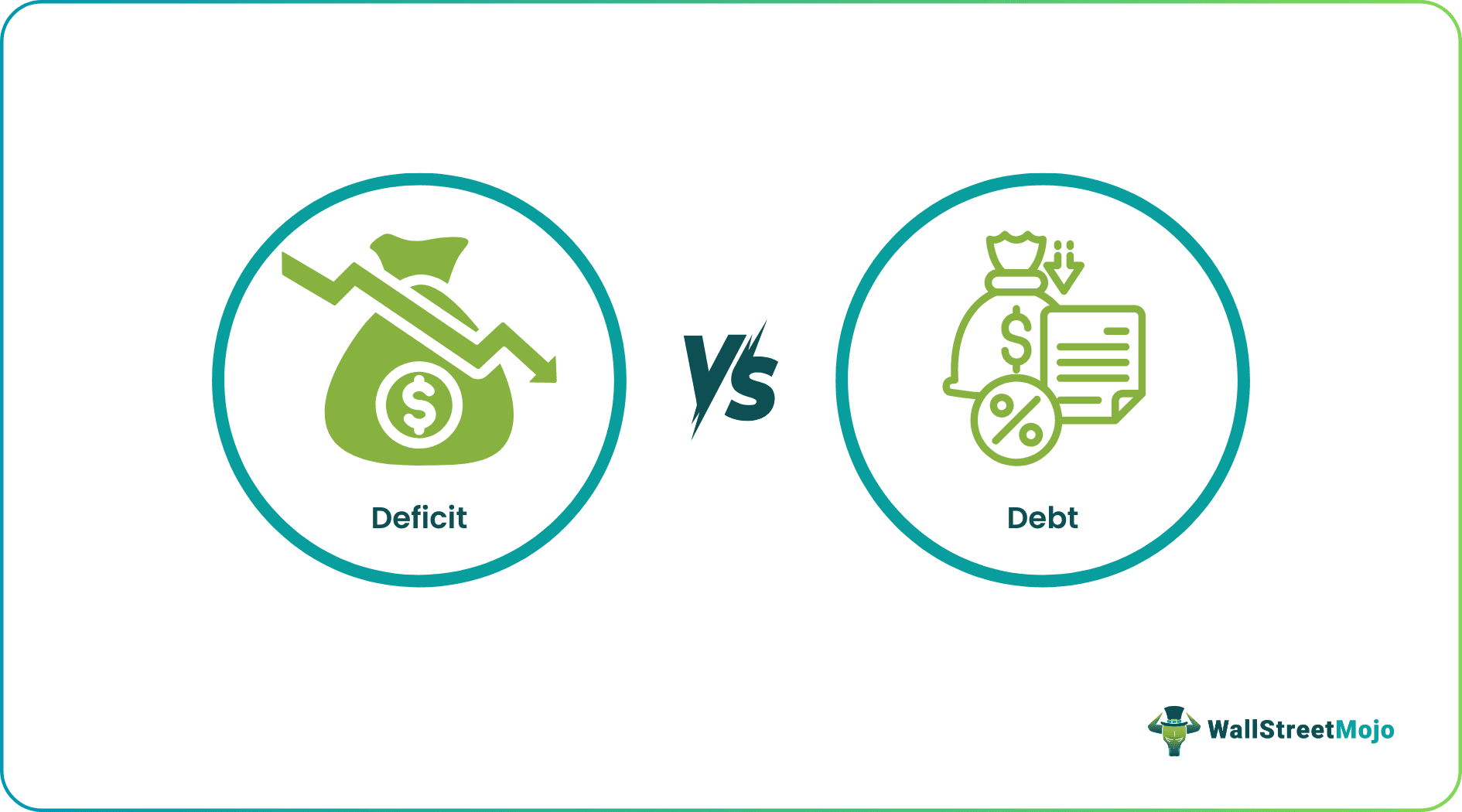Table Of Contents
Difference Between Deficit and Debt
The deficit in a country’s economy is its excess expenditure or spending over its income and revenues. It is calculated for a particular period and represents the amount that needs to be borrowed. In contrast, debt is the total sum of money already borrowed by the government from other countries or lenders to accommodate the expenditure. Therefore, it represents the total amount borrowed and is still outstanding.

- Deficit and debt are often a result of each other. For example, whenever there is a budget deficit, the government of that country borrows funds from another country to fulfill that deficit, which makes the country somewhat self-reliant. In that way, it becomes easy for a country to function.
- Deficit generally refers to the difference between the sources of the funds and the government's expenditure. In a budget, there is either surplus or deficit. A deficit occurs when the country exceeds the expenditure over its revenues like taxes and other revenue receipts. In developing nations like India, a budget deficit signifies the country's growth.
- On the other hand, debt refers to the national debt of a particular country and the money it has borrowed from its associates due to a deficit. The country’s Debt can come from various international organizations like the International Monetary Fund or the World Bank. Debt is like the balance between the government’s revenue and the expenditure that the government is expected to incur in the coming year or has already taken debt on the deficit that the government is experiencing.
Deficit vs Debt Infographics
Let us see the top differences between the deficit vs. debt.

Key Differences Between Deficit and Debt
- Debt is taken from international institutions or other developed nations with which the country has a good relationship. On the other hand, a deficit occurs from internal factors, and no external forces are responsible.
- Debt might not be considered a good factor, but it is not always a bad factor for the economy if the country has raised debt for capital expenditure. Whereas if the government has raised more debt to repay the interest or the principal installments of the present DebtDebt that the country has already availed, debt can be considered as an ominous figure and may indicate a weak economy. On the contrary, the government’s fiscal deficit is often associated with good economic growth and is often a sign of prosperous growth and development.
- Debt can be expressed as an accumulated deficit of the country over the years. In contrast, a deficit is often referred to as the country’s current-year deficit or the difference between the country’s expenses and revenue in a year.
- Deficit spending often results in speeding and increased growth in the country’s economy. On the other hand, debt plays a major part in slowing down the country’s economic progress as interest payments and different expenses pile up.
Deficit vs Debt Comparative Table
| Deficit | Debt |
|---|---|
| It does not lead to any principal or interest payment to external parties | Debt demand interest repayments and principal repayments of the money borrowed from lenders and other financial institutions |
| There is no external party involved in the process, and the deficit is internal. No obligation exists | There is often an external party involved, and there exists an obligation to repay the borrowed money from the party |
| A deficit of the government generally applies to a single year | Debt generally refers to all of the sums owed by the government |
| It is often Structural and Cyclical | Debt is borrowed from external as well as internal sources |
| A deficit can remain constant over the year if the government carefully spends the money | Debt amount cannot be consistent over the years because of the interest and the principal payments as the loan can be taken and repaid over the years |
| It is not dependent on debt. However, if the country borrows continuously from financial lenders, it can result in a deficit all the time. | It is a result of a deficit. Therefore, whenever there is a deficit in the country's annual budget, the government needs to take on debt. |
Conclusion
In the long run, both deficit and debt damage the economy because of the higher interest rates on the debt repayments. In addition, the regular deficit over many years can also hamper growth. The budget deficit in a recession is good. Still, it negatively affects the long run as the government devotes most of the revenue to pay the mandatory cost of social security. As a result, it has less money on hand to invest and do capital expenditure which increases the employment rate in the country and stimulates growth.
It is not easy to run a developed nation. The United States has the largest fiscal deficit of all. The major government spending there is the payment of the social security cost, a mandatory cost for the government. In a developing nation, India is running on a fiscal deficit of around $90 million, roughly about 3.3% of the country's gross domestic product.
